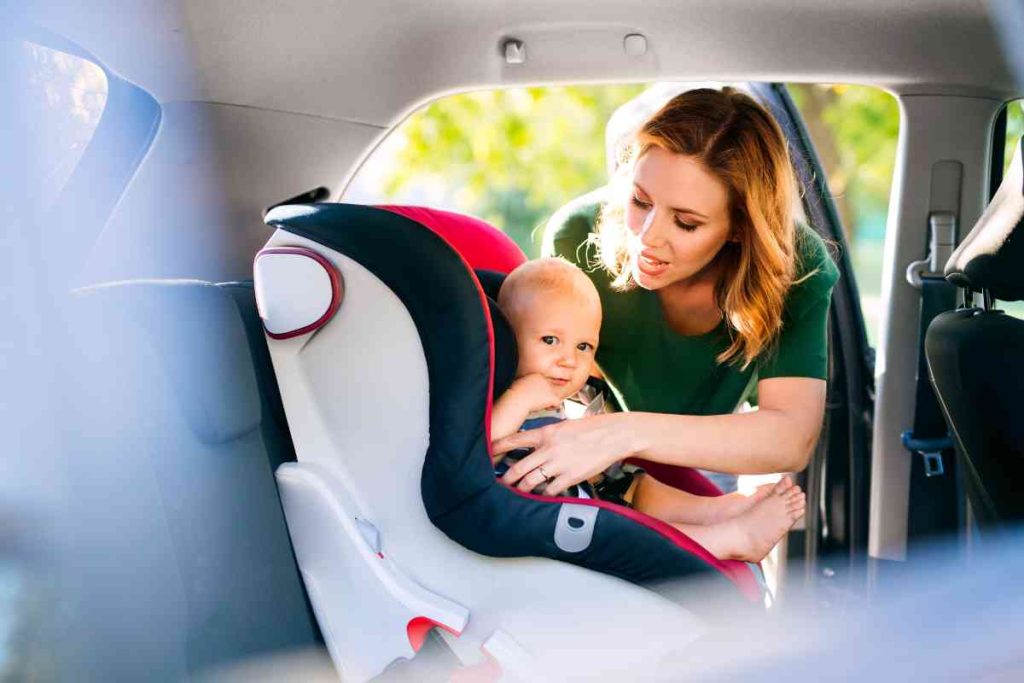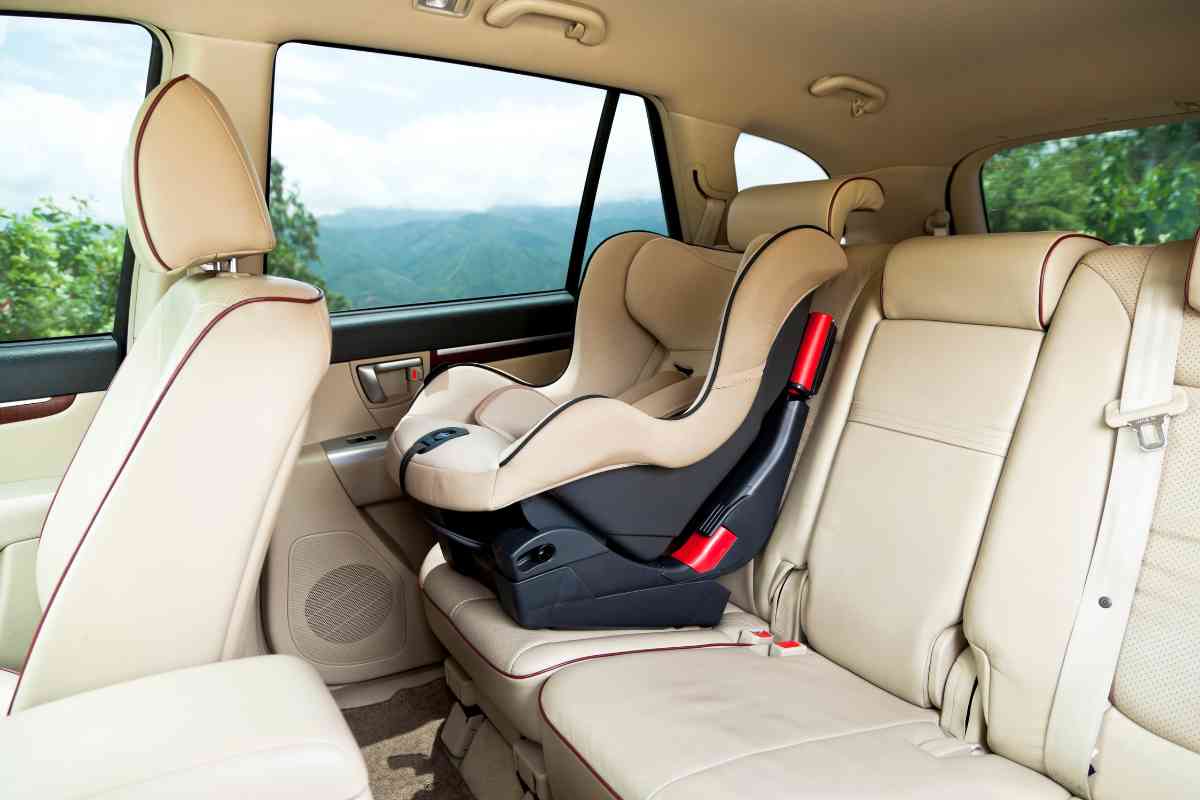Massachusetts laws regarding car seats mandate that children under eight years old or shorter than 57 inches (4’9″) in height must be securely fastened in a child safety restraint system.
A child may be exempt from using a child restraint system if they are physically unable to do so, as confirmed by a licensed physician’s statement.
No specific age is stipulated for transitioning a child to a booster seat. Manufacturers recommend age four or when a child has outgrown their forward-facing car seat.
The article will explain Massachusetts car seat laws so you can better understand them. Keep reading to learn more.
Massachusetts Booster Car Seat Laws
In compliance with Massachusetts car seat legislation, children under the age of 8, measuring less than 4’9″ in height, and having outgrown their forward-facing car seat must utilize a booster seat that meets federal approval.
Children must use booster seats until they have reached a size suitable for seat belt usage. When employing a booster seat, it is crucial to use lap-shoulder belts and stop using lap-only belts.
The primary purpose of a booster seat is to elevate a child, allowing the safety belts to achieve a secure fit on their body. The shoulder belt should rest across the chest area, while the lap belt should cross the upper thighs.
Before transitioning your child to a safety belt, ensure they surpass the height and weight requirements (up to 80 pounds).
Generally, this occurs when the child can maintain a straight back against the seat and bend their knees on the seat edge without slumping.
It is essential to prioritize the child’s height since seat belts are designed for individuals who measure 4’9″ or taller.
Massachusetts Forward-facing Car Seat Laws (2023)

The state advises transitioning children aged 1-3 years to forward-facing seats once they surpass the rear-facing seat limits specified by the manufacturer.
However, certain children may be prepared for this transition at 4. They can continue to ride in forward-facing seats until they reach the age of 7, considering the seat’s weight capacity.
Utilizing a seat that has a 5-point harness is recommended, ensuring that the harness straps snugly embrace the child’s collarbone.
Depending on the available options, you can use either lap-only seat belts accompanied by tether straps or lap-shoulder belts.
Reviewing the weight and height guidelines the manufacturer provides is crucial, as some seats can accommodate children weighing up to 65 pounds.
To ensure proper installation, adhere to the manufacturer’s instructions and securely fasten the seat in the rear seat.
Massachusetts Rear-facing Car Seat Laws (2023)

While the official Massachusetts law does not cover specific requirements regarding rear-facing and forward-facing seats, the state’s official website recommends that infants ride in rear-facing seats until they reach age 1.
However, the American Academy of Pediatrics advises that children utilize rear-facing seats for up to the age of 2.
Convertible seats, which typically possess higher weight limits of up to 40 pounds, offer the advantage of enabling a longer duration of rear-facing usage, potentially up to the age of 4.
This practice proves advantageous as rear-facing seats provide essential protection for the vulnerable body parts of the child, such as the neck and spine, minimizing the risk of injury.
Remember, the seat should always face the vehicle’s rear and be installed in the back seat, away from active airbags.
Massachusetts Car Seat Laws Regarding Front Seat Use for Children
While no specific legislation outlines the requirements for children occupying the front seat, the state strongly advises that children under 13 be seated in the back seat, as it is deemed the safest position.
This recommendation is widely supported by experts due to the potential hazards posed by front seat airbags. Due to the forceful way it deploys during accidents, airbags can pose a significant danger to children.
Children ages 8 and 12 should be appropriately secured with seat belts during travel.
Massachusetts Seatbelt Law
Following the child seat belt rule, all children below the age of 13 whose height exceeds 57 inches in Massachusetts must utilize a seatbelt.
This seatbelt should be securely fastened across their shoulders and lap, irrespective of whether they occupy the front or rear seats of the vehicle.
However, it is essential to note that the provisions of Massachusetts’ child seat belt legislation do not apply to children traveling in school buses or vehicles lacking seatbelts manufactured before July 1, 1966.
Children with physical conditions preventing them from using an adult safety belt are exempted, provided they possess official documentation from a certified physician attesting to this fact.
Massachusetts Car Seat Laws About Cars Without a Backseat
You can place the child-safety seat in the front seat if you’re transporting a child in a vehicle without a rear seat.
This is only permitted if the airbag can be deactivated manually. However, it is crucial to strictly avoid carrying children in the cargo bed of a pickup truck.
Massachusetts Laws on Leaving a Child in a Car Unattended
While Massachusetts has no direct law against leaving children unattended in vehicles, those entrusted with their care can potentially face child endangerment or neglect charges.
The legal landscape surrounding this matter remains unclear, with 606 CMR 7.13(3)(j) explicitly mandating that daycare providers must never leave a child unattended in a vehicle but failing to address private vehicles explicitly.
To gain a broader perspective on regulations concerning the unattended presence of children in vehicles, it is advisable to explore the legislation in other states like Michigan, New Mexico, and Delaware.
Learning the various nationwide statutes will enhance your understanding of the legal ramifications of this crucial safety concern.
Massachusetts Law on Smoking in a Car with a Child Present
Massachusetts has no specific legal prohibition against smoking in a vehicle with a child passenger.
However, legislative efforts are underway to establish such a measure, transforming it into a criminal offense.
The underlying objective of this proposed legislation is to uphold the well-being and ensure the welfare of children exposed to the detrimental consequences of second-hand smoke within confined environments.
It is crucial to acknowledge that despite a dedicated law, smoking in a car with a child can still lead to fines or penalties under other existing statutes, including those on child endangerment or reckless driving.
Massachusetts Taxi Car Law
In Massachusetts, it is compulsory for all youthful passengers traveling in motor vehicles to occupy a child restraint system that aligns with federal safety standards and is diligently fastened and secured following the manufacturer’s instructions.
The aforementioned legal requirement extends to children under eight or possessing a height of less than 57 inches.
Remember that failure to adhere to this regulation can result in monetary fines and the accrual of penalty points on the driver’s license.
Consequently, drivers must prioritize the safety of their young passengers by consistently adhering to this law.
Massachusetts Second-Hand Car Seats
Parents must undertake a comprehensive due diligence process before acquiring a pre-owned child-safety seat in Massachusetts.
This entails verifying the seat’s history to ascertain if it has been involved in any vehicular collisions, inspecting for an expiration date, and ensuring the completeness and integrity of all components.
Additionally, it is essential to investigate potential recalls by cross-referencing the date of manufacture and model number. If a recall notice is identified, promptly contacting the manufacturer becomes imperative.
At What Age Can Children Sit at the Front Seat in Massachusetts?
Safety experts unanimously advise that the back seat is the most secure location for your child within a vehicle. But, once they reach 13, they are eligible to occupy the front seat.
It is vital to bear in mind that regulations concerning front seat occupancy diverge among states, necessitating a thorough examination of your state’s specific front seat laws before granting permission for your child to occupy that position.
Always prioritize safety above all else, for it is paramount. To gain further insights into front-seat regulations across the United States, checking the guidelines in California, Florida, and Indiana would be beneficial.
Comparing and contrasting these regulations will give you an overall understanding of front-seat policies for children nationwide.
Massachusetts Car Seat Laws Exemption
Commercial vehicles are exempted from adhering to the car seat laws imposed by the state. Similarly, automobiles produced before July 1966 without seat belts are exempted from such requirements.
Moreover, children can be exempted from these regulations only if certified by a physician as having a disability or a physical condition.
This disability must make it unsuitable for them to utilize a standard child restraint system or a specialized child restraint device tailored for children with special needs.
Expected Changes to Massachusetts Car Laws
Massachusetts car seat laws have remained static for a considerable duration, failing to align with our current studies on child passenger safety.
However, recognizing this discrepancy, future amendments to the law will introduce novel elements that will cover height and weight requirements, rear-facing seat provisions, and booster seat utilization.
The primary objective of these forthcoming modifications is to fortify the safety of our young ones during vehicle journeys.
Related:

